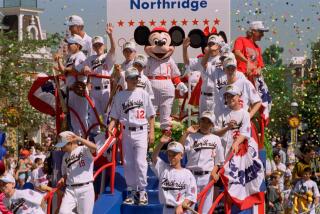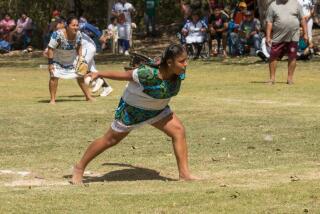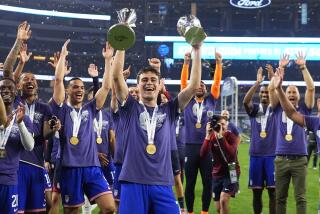BASEBALL DIPLOMACY : Nicaraguan National Team Is Here to Find Out How Many Friends It Can Win, Not How May Teams It Can Beat
- Share via
It was a scene that has been played out thousands of times in thousands of ballparks. This time seemed no different.
The hitter snapped his wrists and connected solidly with the ball, sending it screaming over a distant fence. As he circled the bases, his teammates came streaming out of their dugout to greet him. After crossing the plate, he made his way through a gauntlet of high-fives.
Just another day at the old ball yard? Hardly.
The batter was shortstop Arnoldo Munoz, a member of the Nicaraguan national team. The home run came at Cal State Long Beach against the 49ers in one of four games on a U.S. tour by the Nicaraguans. They also played Friday at College of the Canyons and will conclude their 10-day stay today with a game at UCLA.
The games are incidental. The Nicaraguans are not here to show how many balls they can hit, but how many friends they can make.
Plans for the tour were spearheaded by Andrew Liberman, a Los Angeles free-lance writer and political activist, following a trip through Nicaragua last year by a group of semipro American baseball players. That tour was called Baseball For Peace. This one has been labeled Bats Not Bombs. Liberman sees it as a way to ease the political tension between the U.S. and Nicaraguan governments.
“We wanted this to transcend politics,” he said. “We wanted to show that Americans and Nicaraguans could treat each other like people, and that if they did that in the battlefield, you wouldn’t have a battlefield. Baseball is proving that people can get along with each other. War is an abnormality. This is the commonality.”
When the idea of Bats Not Bombs was conceived in January, Liberman said he was warned that the American government would throw one roadblock after another in his path, but was surprised to find almost no hurdles. He arranged the visas through the U.S. Embassy in Nicaragua, and received the cooperation of the State Department and the backing of several senators.
The Nicaraguan traveling party, consisting of players, coaches, baseball and government officials, totals 26. The air fare for the trip is $15,000. The Nicaraguan government agreed to pay half.
The other half was picked up by Athletes United For Peace, a nonprofit, nonpolitical organization with about 1,500 members, including former Stanford University and San Francisco 49ers quarterback Guy Benjamin, Willie Banks and Bob Beamon from track and field, and sports attorney Leigh Steinberg. The group hopes to raise $10,000 in all for Bats Not Bombs, with any leftover funds going toward the purchase of sports equipment for Nicaraguan children.
Both Benjamin, executive director of Athletes United For Peace, and Liberman compared this tour to the Ping-Pong diplomacy that is credited with helping begin the dialogue that restored relations between this country and China in the 1970s.
But Bats Not Bombs nearly bombed before the opening pitch.
When a visa was denied to Danilo Aguirre, a Nicaraguan politician and newspaper editor, the team skipped its scheduled flight to California on Sept. 25, causing it to miss its first scheduled game, against a college all-star team in San Francisco. After two days of deliberations, the Nicaraguans relented and allowed the team to go ahead with the rest of the tour.
Now there is talk of another American trip in the spring for the team from Central America.
If there is to be a bridge of peace built between the two countries, it would figure to be constructed out of baseball bats. Carlos Cuadra, Nicaragua’s national director of baseball, estimates that 300,000 of his nation’s nearly 3 million countrymen play the sport, at some level, from their equivalent of Little League on up. It is Nicaragua’s No. 1 sport. The game has been played there almost as long as it has been played here, according to Cuadra.
American baseball is beamed in on Nicaraguan television, and interest in it is always high, said Cuadra, regardless of the political climate at the time.
“Sport is sport,” he said through a translator. “It is like an embrace between brothers. It is incredible. They even play it in the war zones.
“We have had some very touching moments here. We are glad to see someone interested in sports, not bombs. We hope this tour opens the windows for peace and hope. Since the American embassy was willing to give us visas, that alone is telling you that they want it to work.”
“We prefer to see our young people in baseball uniforms instead of military clothes.”
More to Read
Go beyond the scoreboard
Get the latest on L.A.'s teams in the daily Sports Report newsletter.
You may occasionally receive promotional content from the Los Angeles Times.










